| |
|
The surroundings of "Antica
Fonte" farmhouse: the Tuscan art cities...
|
 |
| |
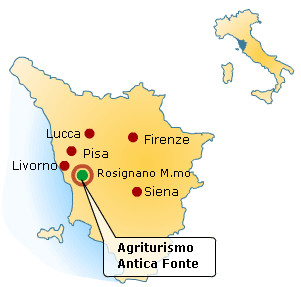 |
 |
The Art Cities and
the Medioeval Villages |
|
| |
| DISTANCE FROM THE MAIN TOURIST ROUTES |
| Lorence 90 Km |
Siena 80 Km |
Pisa 30 Km |
| Leghorn 23 Km |
Volterra 40 Km |
San Gimignano 70 km |
|
|
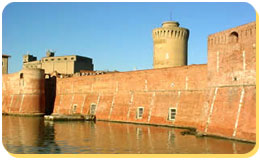
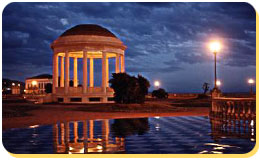 |
LIVORNO
Livorno, founded by the Medici family, grand dukes of Tuscany, as the 'ideal city', is recognizable
by the imposing sight of the bastions of the Old Fortress
(Fortezza Vecchia), overlooking the port. The Darsena
Medicea, ancient pier of an inviting city, is a lively
place to meet up and to stop off.
The Tuscan landscape starts from
Livorno and opens up towards the Mediterranean
sea with which it has a century old historical, commercial
and cultural bond. The sea reaches deep into the historical
quarters of the city through a series of canals called Canali
Medicei making Livorno the only Tuscan city encircled
by the Mediterranean.
Its history, traditions, culture, intense
sunsets, clear fragrant air, water sports, local cuisine all
tell a story of the relationship between Livorno and the sea.
The first seaside bathing stations in Europe began to emerge
here in the 1800s together with the notion of seaside holidays.
Precious treasures from the sea can be seen at the Natural
History Museum and Aquarium.
|
| |
|
|
Original features of the New Venice
quarter, built in the 1600s, are still evident today.
The Medici canals are particularly striking; a tight web of
navigable canals that connected warehouses and merchants houses.
They have their foundations and entrances in the water, just
like in Venice, which lead into large rooms where they used
to store goods.
Walking along via Borra you can admire the elegant architecture.
The neighbourhood is rich in religious and public buildings
like the Bottini dell'olio, which are beautiful vaulted warehouses
for preserving oil, built in the 1700s, or like the Piazza
della Repubblica which is still admired today for its unusual
construction which is actually a very large bridge that covers
a long stretch of the navigable canal.
|
| |
|
MONTENERO
Montenero and its famous Santuario are found just barely south of Livorno. Montenero gets its name from a dark past when the hillside
was seen as a sinister and damned place.
Another story also tells of an apparition by a pastor in
the 14th century. He claimed to have seen an apparition of
the Madonna. (Today one can still visit the splendid chapel
that glorifies this very apparition.
|
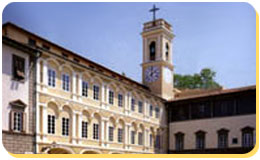 |
| |
|
After that miraculous episode, the inhabitants of the area
built the Santuario in Montenero in honor of the Holy Virgin.
After centuries of changes, like that of the bell tower addition
in 1820, we arrive to its present
day aspect. Apart from its worshippers, the Santuario is also
visited for its many works of art like the marble altar, the
Crucifixion and its beautiful ceiling of gold finished in
1600.
The marvelous panorama from the Santuario opens into a typical
Tuscan valley that slopes gently to the sea. In remote times
the Montenero hills were a useful and natural reference point
for sailors, who often had their lives saved by the sight
of them. In a sign of appreciation to the Madonna, many of the sailors
donated minor works of art to the Santuario.
|
| |
 |
PISA
Pisa is set in a wide floodplain (4 m. above sea level) few kilometres
far from the Tyrrhenian coast and it stretches
in the two bank of the river Arno.
Pisa is among the main cultural city of Italy. It keeps a rich artistic heritage
with its original Medieval reworking of Islamic, Lombard and local influences.
It is to note the wonderful Duomo and the leaning
tower, a monument discussed and known as one of the seven wonders of the
world.
|
| |
|
|
It is a chief town of a province of Tuscany and an archiepiscopal see. Nowadays
it is above all a university and research town.
|
| |
|
SIENA
Siena always attracts many tourists for its wonderful monuments and
its numerous masterpieces to visit in its museums.
Some great artists were born in Siena and among them it is to remind Duccio di
Boninsegna and Nicola Pisano, who worked on the greatest masterpiece in Siena: the
Duomo.
In narrow and winding lanes, in museums and in the quarter oratorios you may
hear Palio propitiatory chants that recall the ancient
customs and modern allegories. In the evening, on the other side, the patter
of soles on the desert paving contrasts to the peace of the green valleys surrounded
by the walls by its ancient administrators, for centuries till today.
In the town you may admire many masterpieces such as the Duomo, set in the Campo,
Siena's red-bricked main square and the wonderful landscape of Facciatone, the hall
of Pellegrinaio in Santa Maria della Scala, the Piccolomini
library, the prestigious Accademy Chigiana and the wide rooms in Fortezza
Medicea, that hides the rarest wines in Siena, in Tuscany and in the peninsula.
|
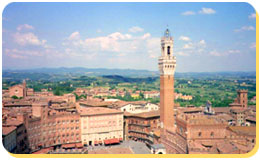
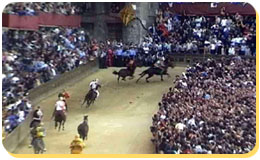
|
| |
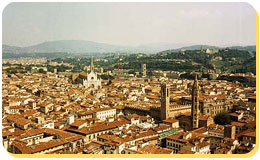
|
FLORENCE
Florence stands in a pleasant valley surrounded by hills and crossed
by the river Arno. This city is rich in
monuments, historical buildings, galleries and museums, expressing all
its magnificence of its ancient civilization.
Its world famous promenade along its monuments up to the wonderful Ponte
Vecchio (Old Bridge) is lined with characteristic goldsmith's shops.
|
| |
|
| Many are the monuments and the masterpieces
to visit, such as Giotto's
Tower begun by Giotto in 1334, the Pitti Palace begun from an original
design by Brunelleschi in the second half of 1400, the courtyard of Ammannati, Buonarroti
house which has some paintings of Michelangelo, Forte
di Belvedere that dates from the end of 1500. The Uffizi
Palace begun by Vasari in 1560, Loggia della Signoria begun
in1376 from an original design by Arcagno and Palazzo Vecchio built
between 1293 and 1314. |
| |
|
LUCCA
Lucca is a charming Tuscany city of arts with its numerous attractions.
You will go to visit the witness of its prestigious past and enjoy its
several amusements in a hearted and happy place.
It is 20 Km. North-East away from Pisa, 60
Km West away from Florence, near the beach
resort of Viareggio: indeed Lucca is worthy
of a visit…
|
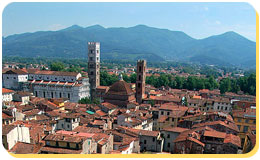 |
| |
Lucca is, above all, the main city of the art for the silk. To note also
the basilica of St. Frediano of the XII c.,
with its mosaic face that just worth a visit of this city. There are also
the churches of San Pietro Somaldi and St. Maria
Foris Portam.
During 1300 the town had several ups and downs but this period is important
for the churches of St. Francis, Della Rosa, St.
Giulia and its numerous palaces, houses and tower-houses in gothic
style. |
| |
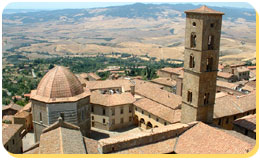 |
VOLTERRA
Lonely on a hill (that has its boundless view from the Appennini up to the Tyrrhenian
sea), stern and peaceful at once, this town has a particular glamour that is
different from the others.
Once you reach its threshold, you will be impressed by the mighty wall, both
of the Medieval times and Etruscan ones, where there are many gates.
The most famous of them is Porta dell'Arco Etrusco
(the gate of Etruscan Arch). Indoors you will find remembrances of the severe
town of Volterra during the Medieval times. All this is helpful for us to understand
the charming of its beauty.
|
| |
|
|
SAN GIMIGNANO
The 15 medieval towers (a reminder of the 72 towers
that used to rise during the period of greatest splendor) announce from far away
the town's magnificence.
The amazement continues after entering one of the town gates, that open in the double
enclosed wall, and walking up the silent streets flanked with ancient
buildings.
The streets unexpectedly lead into three squares on the summit of the town, where
the severe medieval buildings that surround them may be admired.
|
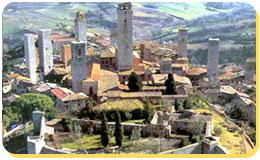 |
| |
|
 |
|







